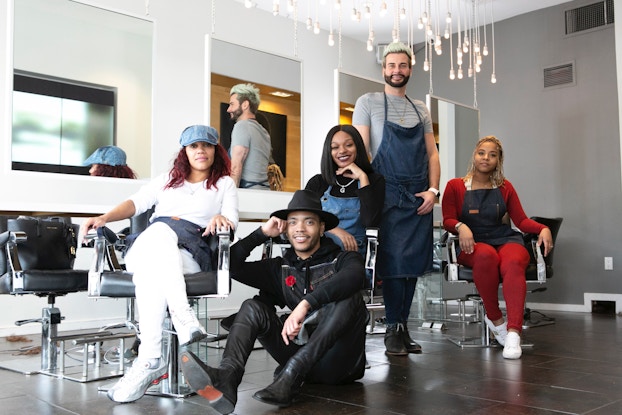Every small business owner has their own unique story, and throughout the COVID-19 pandemic each business owner's unique business model, mission and personality reflect in the ways they have pivoted in the face of temporary closures, government regulations and altered consumer demands. From hair salons and dance studios to food trucks and dairy farms, these five small business owners share their personal stories of how COVID-19 has dramatically changed not only their businesses but also their hopes for the future.

Dominik Mager, owner, The Club by DM
The biggest challenge facing my business right now: keeping everyone healthy and safe. After being closed for three months, the entire team is so excited to be back at work and the energy in the salon is extremely positive. It's so important that we maintain a clean and sterile environment as we welcome our loyal clients back into the salon. All of our hair stylists and clients are wearing masks and the staff are sanitizing and conducting temperature checks. I want our customers to have confidence and know that I am going above and beyond to keep everyone safe. After months of social distancing, the act of getting your hair styled and cut by a stylist can feel like such a luxury and our clients have been so appreciative of our services. Follow The Club by DM on Instagram: @theclubbydm.

Fanny Gonzalez, president, Corazon Latino Dance Studio
The biggest challenge facing my business right now: quite literally everything — from running the business and making ends meet to following the local health regulations and holding classes at limited capacity. I closed the studio for three months and shifted to an online class model, and I continue to offer a hybrid of in-person and online offerings. The studio went from having 18 instructors before the pandemic to only 7 employees. With social distancing measures in effect and only a handful of students in the classes, it’s challenging to pay rent and all of the bills as well as the instructors. It is my hope that the studio’s heart keeps beating strongly and we continue to empower people with the rhythm of Latino music that encourages dance and fitness as a way to live a healthy life. Follow Corazon Latino Dance Studio on Instagram: @corazonlatinoz.

Gerard Klass, co-owner, Soul Bowl
The biggest challenge facing my business right now: staying open. The restaurant brings soul food to quick service and we cater to the diverse dietary needs of the community. My wife and I came from steady corporate jobs in the restaurant industry. The pandemic hit when we were only 6 months into our journey as a brick-and-mortar location at a collective of food businesses. We provide a livelihood to our employees and our families and we found ourselves redoing our entire business model. We had finally opened a location last year and only a few months later had to switch to a takeout and delivery model and adapt quickly. We also launched the ‘Food for your Soul’ free meal program in March to support local families in need by providing over 5,000 meals. We are supporting the Black community by staying open and providing nutritious food. With our skills and our business, we want to use our resources to help and not just sit on the sidelines. We continue to feed volunteers, deliver meals to families in need and sponsor meals. Follow Soul Bowl on Instagram: @soulbowlmn.

Mark McConnell, co-owner and operator, Off the Rez and Via Tribunali
The biggest challenge facing my business: getting people comfortable with eating out in public again. I own and operate the Off the Rez food truck and cafe and most recently a pizza business. The pandemic shifted how we run our business at a time when we were phasing out the food truck. We were initially shut down for weeks until we partnered with the Seattle Cancer Care Alliance and began serving meals to the healthcare workers from our food truck. Safety is a priority for our employees and customers, so we maintain stringent monitoring and sanitization protocols. Now outdoor dining is allowed and the food truck is back at the breweries. We are also looking at neighborhoods for the truck where many people are working from home. I am also taking over a family pizza business and am finding the downtown area to be a ghost town. Pizza is a comfort food and the ultimate grab-and-go item and I hope that the neighborhood will get back to normal soon. Follow Off the Rez and Via Tribunali on Instagram: @offtherez & @viatrib.

Meg Stuedeman, co-owner, Derrydale Farm
The biggest challenge facing my business right now: scheduling delays with our small meat processor. We have been fortunate that the pandemic has not affected us negatively. Our farm is home to approximately 175 animals. Our dairy is sold to a food co-op which serves consumers instead of the food service industry and sets the price of milk for the year. For us, things have changed very little and we are so fortunate due to our (small) scale and production. We use a small meat processor that can handle up to 40 animals per week. Our animals are on the waitlist and will go to processing later than scheduled. Although things don’t look much different here compared to life before the pandemic, consumers are now asking important questions about food policy and security. The food waste that resulted from the closing of businesses, schools, restaurants and hotels is staggering. Food banks can absorb only so much, especially at a time when many Americans are struggling to put food on the table. The pandemic has been a wakeup call for American consumers and I hope that the good repercussions are here to stay.
CO—is committed to helping you start, run and grow your small business. Learn more about the benefits of small business membership in the U.S. Chamber of Commerce, here.

Interested in a small business membership?
Find out how the U.S. Chamber of Commerce can help your company grow and thrive in today's rapidly-evolving business environment. Connect with our team to learn how a small business membership can benefit your bottom line and help you achieve your goals.




